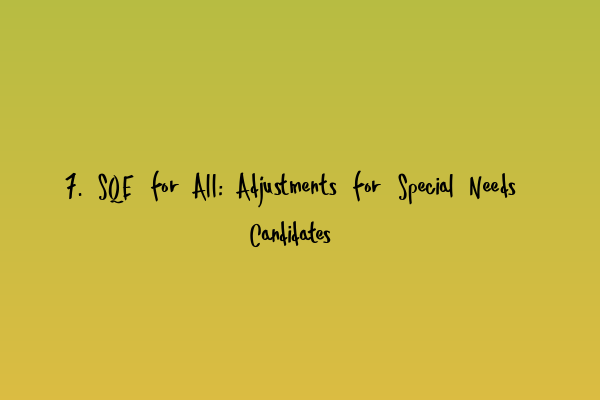7. SQE for All: Adjustments for Special Needs Candidates
As the legal profession continues to evolve, it is crucial that the Solicitors Qualifying Examination (SQE) is accessible to all aspiring solicitors, including those with special needs. The SQE aims to provide a fair and objective assessment of a candidate’s legal knowledge and skills, ensuring that only the most competent individuals are admitted into the legal profession.
Special needs candidates, who may require adjustments or accommodations during the SQE, should be aware of the provisions available to them. In this article, we will explore the adjustments that can be made for special needs candidates and the steps they should take to request these adjustments.
The Importance of Accessibility
Accessibility is at the heart of the SQE. The Solicitors Regulation Authority (SRA) recognizes the diversity of candidates and ensures that the examination process is inclusive and fair. Special needs candidates should not face barriers that prevent them from demonstrating their abilities and potential.
By providing appropriate adjustments, the SRA aims to level the playing field and enable special needs candidates to perform to the best of their abilities. These adjustments may include additional time, the use of assistive technology, or alternative formats for examination materials.
Step 1: Identifying Special Needs
Before requesting adjustments for the SQE, candidates must first identify and provide evidence of their special needs. This may include physical disabilities, learning difficulties, visual impairments, or any other condition that could impact their examination performance. It is crucial to gather relevant medical or professional documentation that supports your requests.
If you believe you may require adjustments, it is essential to reach out to a qualified professional, such as a doctor or an educational psychologist, who can formally assess your needs and provide the necessary documentation.
Step 2: Requesting Adjustments
Once you have identified your special needs, the next step is to submit a formal request for adjustments to the SRA. This should be done well in advance of the examination date to allow sufficient time for the necessary arrangements to be made.
You can submit your request by contacting the SRA directly or through the online portal provided on their website. It is essential to be clear and specific about the adjustments you require, ensuring that they are reasonable and necessary to ensure a fair assessment.
Along with your request, you must include the relevant documentation that supports your special needs. This documentation will assist the SRA in assessing your request and determining the appropriate adjustments.
Step 3: Assessment of Adjustments
Once your request and supporting documentation have been submitted, the SRA will thoroughly review your case. They may consult with relevant experts or seek additional information if required. The SRA is committed to ensuring that adjustments are fair, reasonable, and do not compromise the integrity of the examination process.
While the SRA aims to accommodate special needs candidates, it is important to note that all adjustments are subject to assessment and approval. Each request is evaluated on a case-by-case basis, taking into consideration the nature of the special needs and the specific requirements of the examination.
Step 4: Examination Process
If your request for adjustments is approved, the SRA will communicate the specific arrangements to you ahead of the examination. This could include additional time, specialized equipment, or any other necessary accommodations.
It is crucial that special needs candidates arrive at the examination center well in advance to allow time for setting up the required adjustments. The examination center staff will be available to assist candidates and ensure a smooth and comfortable examination experience.
Conclusion
The SQE aims to provide a fair and inclusive assessment for all aspiring solicitors, including those with special needs. By taking the necessary steps to identify their needs and request appropriate adjustments, special needs candidates can overcome any barriers and demonstrate their legal knowledge and skills effectively.
Find SQE 1 Practice Exam Questions here.
Access SQE 1 Practice Mocks FLK1 FLK2 here.
Explore SQE 2 Preparation Courses here.
